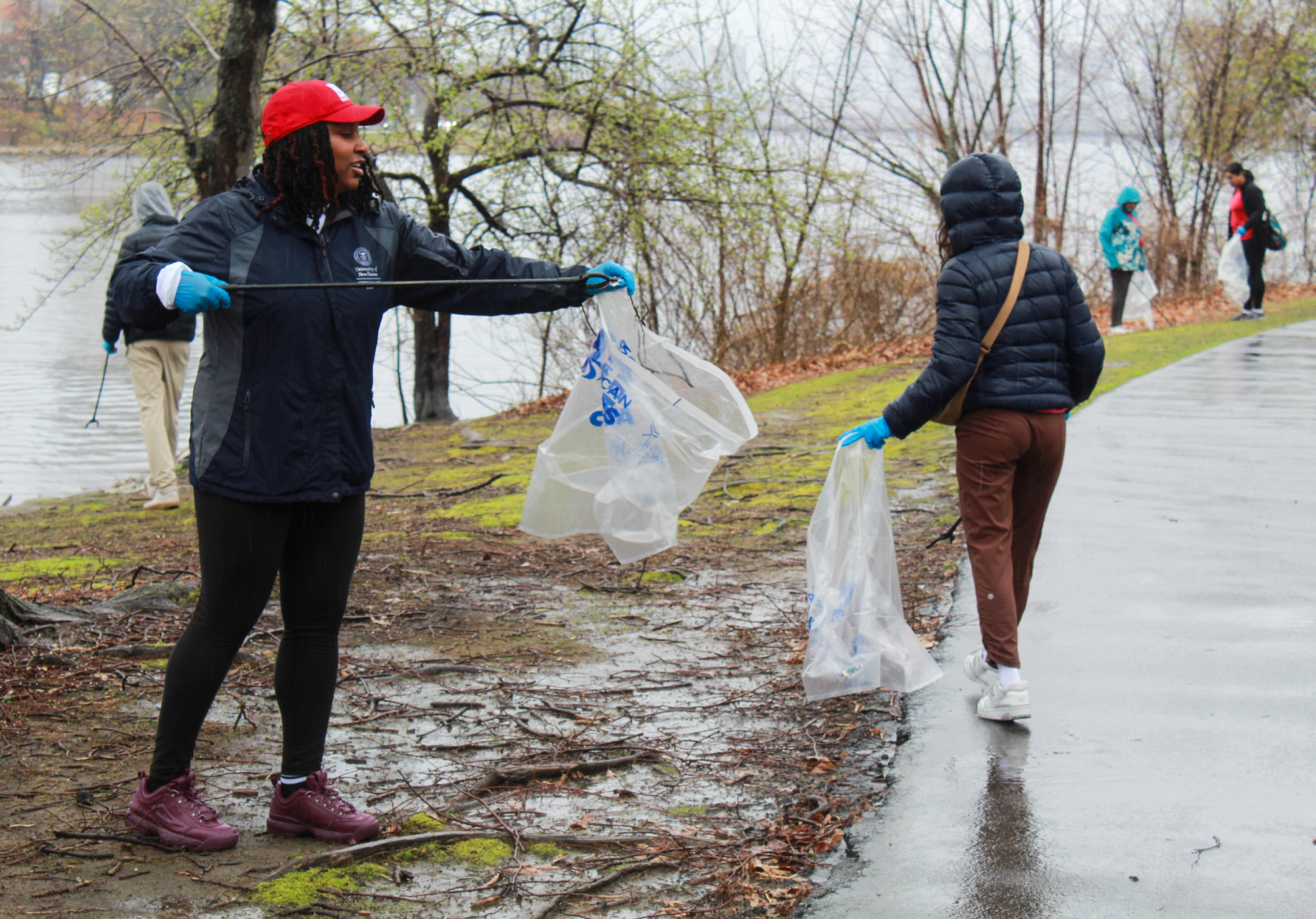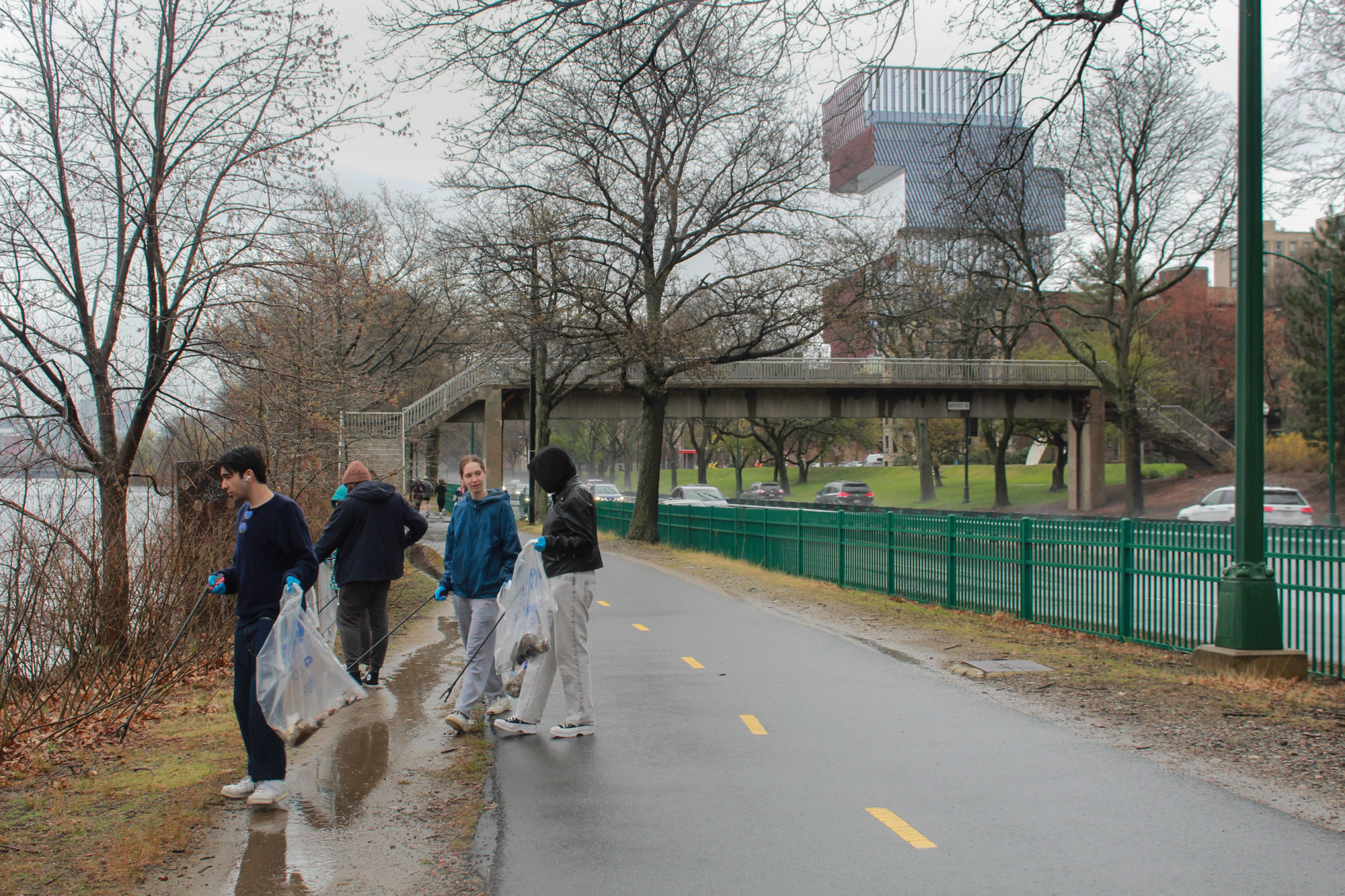Being kind to your neighbor is common decency — but kindness is a bigger job when your neighbor is a 3-mile stretch of land along the Charles River.
More than 50 Boston University students helped to clean the Esplanade as part of the 25th annual Earth Day Charles River Cleanup on Saturday. Part of BU Sustainability’s Earth Day 365 initiative, the cleanup was a campus-wide collaboration with the Esplanade Association to involve students in caring for BU’s largest, greenest neighbor.
“The Esplanade is right in our backyard,” said Sam Moller, assistant director of communications at BU Sustainability. “It’s important for us, as BU community members, to ensure that we have a clean Esplanade for years to come and to celebrate this incredible space here that we have right next to us.”

The Massachusetts Department of Conservation and Recreation organizes the Charles River Cleanup every year, along with five nonprofit environmental groups including the Esplanade Association. Each organization oversees the cleanup and the year-round maintenance of a different segment of the 80-mile river, which flows from Hopkinton to Boston Harbor.
The Charles River Cleanup — one of the largest Earth Day cleanups in the country — draws more than 3,500 volunteers annually to collect trash from the Charles River and its tributary, the Muddy River, said Jen Mergel, executive director of the Esplanade Association.
More than 600 of those are volunteers to clean the Charles River Esplanade, which stretches 64 acres from the Museum of Science to BU Bridge.
The Esplanade is a “very visible” part of the campus community and a popular hangout spot for both students and staff, said Aliyah Phipps, residence hall director at Warren Towers.
“It’s very much a part of what a lot of students and staff love about BU,” she said. “We need to take care of it.”
The association assigned BU volunteers to clean the area from the BU Sailing Pavilion to the Massachusetts Avenue Bridge, said Molly Ryan, volunteer and engagement coordinator at the Esplanade Association.
Pedro Falci, managing director of Student Wellbeing, said multiple campus organizations discovered they each wanted to join the Esplanade Association’s cleanup for Earth Day 365 — BU Sustainability’s month-long series of more than 30 events that encourage caring for the planet, which ends today, on Earth Day.
The groups combined forces to promote campus-wide involvement, resulting in a joint effort among Warren Towers Residence Life, BU Wellbeing, BU Police Department, Questrom Social Impact and Non-Profit Club, Questrom Graduate Council and Questrom Serves.
“We’re a privileged campus in terms of our access to the Esplanade and our view of the Charles River, and I feel pretty confident saying nobody wants that space to become dirty and uncared for,” Falci said. “This is a chance to be a good neighbor and promote environmental wellbeing in that regard.”
Promoting environmental wellbeing is especially important in an urban area like Boston, where there are more people and more trash but fewer green spaces, Phipps said.
Because the Esplanade is the area of the river closest to urban Boston, it requires more upkeep than other areas of the river, Mergel said. The last 3 miles of the river are downriver from the rest of the Charles — accumulating a lot of trash leading up to where the river flows into Boston Harbor.
“It’s important for us, being a campus in a dense urban setting, to cherish and to really appreciate nature,” Moller said.
Since BU’s campus is shared among so many people, students might not always feel obligated to care for the environment around them, Mergel said. But when they help clean a communal space like the Esplanade, it can strengthen their sense of civic and social responsibility toward their natural surroundings.
“You could be from Tokyo or Tulsa, or you could be from Tyngsborough, or you could be from downtown Boston, and you have the opportunity to feel like you have a stake in taking care of the landscape,” Mergel said.

For Ileana Nunez, a freshman in the College of General Studies, noticing trash whenever she would walk on the Esplanade motivated her to help clean it up on Saturday.
“It is definitely important because there’s so many of us, and there’s trash everywhere,” Nunez said. “We have to make sure we’re doing our part.”
Environmental initiatives like the Charles River Cleanup are a chance for students to interact with nature hands-on — a rare opportunity in such a major city, said Ella Hinkelman, a senior studying environmental science in the College of Arts and Sciences who participated in the cleanup Saturday.
“Keeping [the Esplanade] green is really important because it’s one of the few places in urban Boston that you can retreat to that kind of space,” Hinkelman said.
As a college student in an urban area, Nupur Aroskar said that having a natural landscape nearby is “grounding,” both physically and mentally.
“I’ve had my best memories on the Esplanade,” said Aroskar, a senior in the Sargent College of Health and Rehabilitation Sciences, who participated in the cleanup.
Ellie Westphal, a freshman in the College of Engineering, decided to attend the cleanup after hearing about it in one of her classes, “Public Gardens and Urban Wilds.” She said the course discussed how cities often face more severe environmental problems than non-urban areas.
“One of the easiest ways to help fix those problems is just to get involved however you can,” Westphal said.
Getting involved in sustainability takes many forms, Moller said.
“It can be a cleanup. It can be educating yourself. It could be reading a book on sustainability,” Moller said. “But it can also be an opportunity to appreciate the world around us, and I think that’s something that gets missed in the sustainability conversation.”
As for students who participated in the Charles River Cleanup, Mergel said she hopes they gained a stronger connection to the park and to one another. Above all, she said she hopes they know that helping care for the Charles River connects them to “something bigger” — their fellow inhabitants of Boston.
“The beautiful thing about being on the Charles River is that big reminder: The water doesn’t care what municipality you’re in or what school you’re getting a degree from,” Mergel said. “It’s boundaryless and it continues to flow, and so it’s really the thing that connects us all.”


























































































































